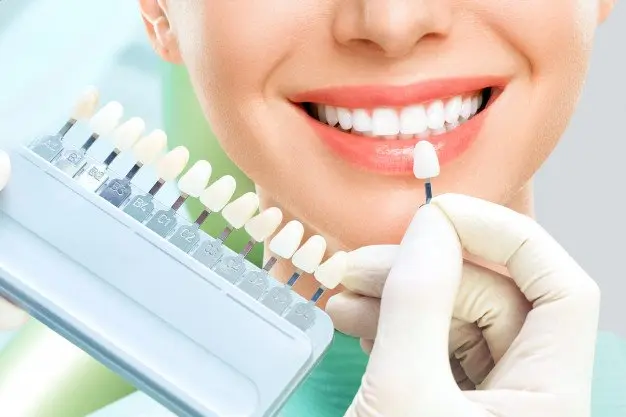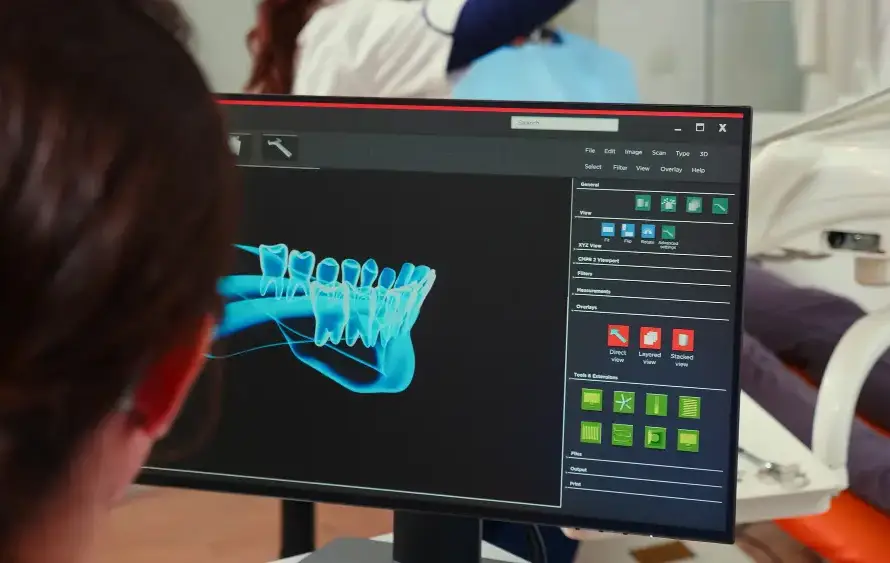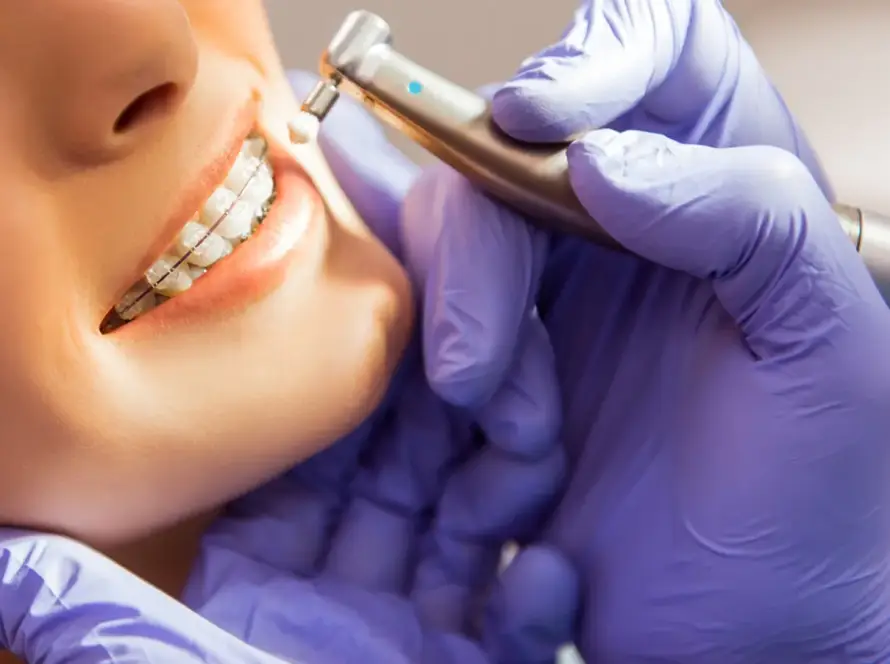Dental veneers are a popular cosmetic dentistry option that can enhance the appearance of your smile. They are thin shells made from either porcelain or composite resin, which are custom made to fit over the front surface of your teeth. Dental veneers can help address various dental issues, such as discoloration, uneven teeth, chipped or cracked teeth, and gaps between teeth.
Porcelain veneers are known for their durability and natural appearance, closely resembling the color and texture of natural teeth. They are stain resistant and can last for many years with proper care. Composite resin veneers, on the other hand, are more affordable and can be applied in just one visit to the dentist.
The process of getting dental veneers typically involves an initial consultation, where your dentist will assess your dental health and determine if veneers are a suitable option for you. If so, your dentist will prepare your teeth by removing a small amount of enamel to ensure a proper fit for the veneers. Impressions of your teeth will be taken and sent to a dental lab for the fabrication of the veneers.
Once the veneers are ready, your dentist will bond them to your teeth using a dental adhesive. Any necessary adjustments will be made to ensure a comfortable and natural looking result. With proper oral hygiene and regular dental check ups, dental veneers can offer a long lasting and aesthetically pleasing solution for improving the appearance of your smile.
In the following sections, we will explore the cost factors related to dental veneers in Turkey, including the types of veneers available, the average price range, and additional expenses to consider. Understanding the cost aspects can help you make an informed decision and plan for your dental veneer treatment in Turkey.
How much do veneers cost in Turkey?
When it comes to dental veneers, Turkey is known for providing affordable and high quality options. The cost of dental veneers in Turkey can vary depending on a few factors such as the type of veneer, the complexity of the case, and the location of the dental clinic. So contact us to find out the prices of our clinic.
- Type of veneer: The cost of veneers in Turkey can depend on the material used. Porcelain veneers are usually more expensive than composite veneers due to their durability and aesthetic appeal. However, composite veneers can be a more cost effective option for those on a tighter budget.
- Complexity of the case: The price of dental veneers in Turkey can also vary based on the complexity of the dental case. If a patient requires additional procedures such as teeth shaping or gum contouring, this may add to the overall cost.
In general, the cost of dental veneers in Turkey is usually more affordable compared to many other countries. However, it is important to consider factors such as the reputation of the dental clinic, the experience of the dentist and the quality of the materials used. Contact us to get an accurate cost estimate according to your specific needs.
The Process of Getting Dental Veneers in Turkey
- Initial Consultation:
- The process begins with an initial consultation with a qualified dentist in Turkey. During this consultation, the dentist will assess your dental condition, discuss your expectations, and determine if dental veneers are suitable for you.
- They will also explain the procedure, potential risks, and answer any questions or concerns you may have.
- Dental Examination and Treatment Planning:
- The dentist will conduct a thorough dental examination, which may involve taking X-rays, impressions, and photographs of your teeth. This helps in precise treatment planning.
- Based on the examination, the dentist will create a treatment plan tailored to meet your specific needs and desired outcome. They will explain the recommended number of veneers, material choices, and expected results.
- Teeth Preparation:
- Before placing the dental veneers, the dentist will prepare your teeth. This usually involves removing a small amount of enamel from the front surface of the teeth to create space for the veneers.
- Local anesthesia may be used to ensure your comfort during the tooth preparation process.
- Impression Taking:
- After tooth preparation, the dentist will take impressions of your teeth. These impressions serve as a mold that will be sent to a dental laboratory where your custom veneers will be created.
- The dentist will also note down the shade and color of your teeth to ensure that the veneers blend seamlessly with your natural teeth.
- Temporary Veneers:
- While your permanent veneers are being fabricated, temporary veneers may be placed on your teeth. These temporary veneers protect your teeth and maintain your appearance while you wait.
- Veneer Bonding:
- Once the permanent veneers are ready, the dentist will remove the temporary veneers (if any) and place the new veneers on your teeth one by one.
- The veneers will be carefully bonded to your teeth using a dental adhesive and a curing light to ensure a strong and durable bond. Any necessary adjustments will be made to achieve the desired look and fit.
- Follow-up Visit:
- After the veneers are placed, the dentist will schedule a follow up visit to ensure that the veneers are functioning correctly and that you are happy with the results.
- They will provide instructions on how to maintain and care for your veneers to ensure their longevity.
It is important to note that the actual process may vary depending on the individual case and the specific treatment plan agreed upon between you and your dentist.
Understanding the Risks and Aftercare
When considering dental veneers in Turkey, it is important to understand the potential risks involved and the necessary aftercare to maintain the longevity of your veneers. While veneers are a safe and effective solution for enhancing your smile, it is essential to be aware of a few possible complications:
- Tooth sensitivity: After the placement of veneers, some individuals may experience temporary tooth sensitivity to hot or cold temperatures. This sensitivity typically subsides over time but can be managed with desensitizing toothpaste or gels.
- Gum irritation: In some cases, the gum tissue surrounding the veneers may become irritated or inflamed. This can be caused by improper fitting or a buildup of plaque. Regular brushing, flossing, and dental check ups can help prevent gum problems and maintain healthy oral hygiene.
- Chipping or cracking: Although dental veneers are durable, they can still be prone to chipping or cracking if not properly cared for. To avoid damaging your veneers, it is essential to avoid habits such as biting your nails, chewing on ice, or using your teeth as tools.
- Discoloration: While veneers are resistant to staining, they can still be susceptible to discoloration over time due to factors like smoking, excessive coffee or wine consumption, or poor oral hygiene. Regular brushing, flossing, and professional cleanings can help ensure your veneers maintain their natural appearance.
Following the placement of dental veneers, it is vital to adhere to proper aftercare to maximize their lifespan and maintain a healthy smile. Here are essential steps to consider:
- Maintain good oral hygiene: Brushing your teeth at least twice a day with a soft bristled toothbrush and using dental floss will help prevent plaque buildup and maintain the integrity of your veneers.
- Avoid staining agents: Minimize exposure to staining agents such as coffee, tea, red wine, and tobacco products, as they can cause discoloration over time. If consumed, rinse your mouth with water afterward.
- Regular dental check-ups: Schedule regular dental check-ups and professional cleanings to ensure the health of your veneers and detect any potential issues early on.
- Use a mouthguard: If you participate in contact sports or grind your teeth at night, using a mouthguard can help protect your veneers from accidental damage.
By understanding the risks and following the necessary aftercare, you can enjoy the benefits of your dental veneers for years to come, enhancing both your smile and your confidence. Always consult with your dentist for personalized recommendations and guidance regarding your specific case.
Why Turkey is a Popular Destination for Dental Tourism
- Affordable costs: One of the main reasons why Turkey has become a popular destination for dental tourism is the significantly lower cost of dental treatments compared to many other countries. The cost savings can be substantial, allowing patients to receive high quality dental care at a fraction of the price they would pay in their home country.
- High standards of care: Despite the lower costs, Turkey maintains high standards of dental care. The country has a large number of well trained and experienced dentists who offer a wide range of dental procedures. Many dental clinics in Turkey are equipped with modern technology and follow international guidelines, ensuring patients receive safe and effective treatments.
- Efficient treatment with shorter waiting times: In some countries, the waiting times for dental procedures can be long, causing frustration and delays in accessing the necessary treatment. However, in Turkey, dental clinics generally have shorter waiting times, allowing patients to receive their treatments promptly and efficiently.
- Accessibility and convenience: Turkey is easily accessible from various parts of the world, making it a convenient destination for dental tourism. The country has several international airports and a well developed transportation system, allowing patients to travel to their chosen dental clinic with ease. Additionally, many dental clinics in Turkey provide services such as airport transfers and assistance with accommodation, making the entire experience convenient for patients.
- Tourism opportunities: Apart from receiving dental treatments, patients visiting Turkey for dental tourism can also take advantage of the diverse tourism opportunities the country offers. Turkey is known for its rich history, stunning landscapes, and vibrant culture, making it an ideal destination for those who want to combine dental care with exploring a new country.
- English speaking dentists: Communication plays a crucial role in providing effective dental care. Many dentists in Turkey speak fluent English, ensuring clear and effective communication with international patients. This eliminates language barriers and allows patients to discuss their concerns, treatment options, and post treatment care without any difficulty.
In conclusion, Turkey has established itself as a popular destination for dental tourism due to its affordable costs, high standards of care, efficient treatment, accessibility, and convenience. Patients can receive top quality dental procedures while enjoying the rich tourism opportunities the country offers. Moreover, the presence of English speaking dentists ensures effective communication and a seamless dental experience for international patients.
Are the prices for dental veneers in Turkey inclusive of all expenses?
When considering the cost of dental veneers in Turkey, it is important to inquire whether the quoted price includes all expenses, such as initial consultations, X-rays, dental impressions, and any necessary follow up appointments. Some dental clinics may offer package deals that cover all these expenses while others may charge additional fees. Contact us for the package deals of our Dent X dental clinic.
Is the quality of dental work in Turkey comparable to that of other countries?
Turkey has a well established and reputable dental tourism industry and many dental clinics in the country adhere to international standards of quality and safety. It is important to research and choose a reputable clinic with qualified dentists who have experience in performing dental veneer procedures.
Does dental insurance cover the cost of dental veneers in Turkey?
The coverage of dental veneers by insurance varies depending on the insurance plan and the specific circumstances. It is advisable to check with your dental insurance provider to determine if they cover dental treatments abroad and if the cost of dental veneers in Turkey would be reimbursed.
Are there any additional expenses to consider when getting dental veneers in Turkey?
Apart from the cost of the veneers themselves, there may be additional expenses to consider, such as accommodation, transportation, and meals if you are traveling from another country. It is important to factor in these additional costs when budgeting for your dental veneer procedure in Turkey.















